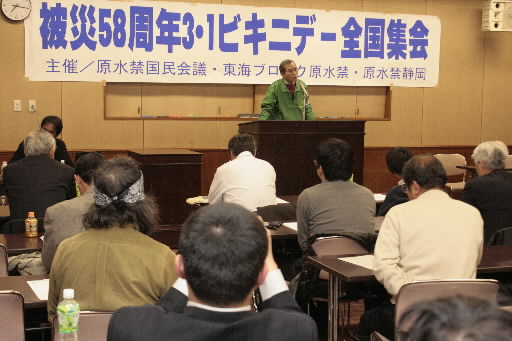Bikini Day rallies vow to prevent repeat of nuclear disasters
Mar. 5, 2012
by Takashi Takekawa, Staff Writer
Antinuclear organizations held rallies on March 1, the 58th anniversary of “Bikini Day,” when the Japanese tuna fishing boat Daigo Fukuryu Maru (The Lucky Dragon No. 5) was exposed to radioactive fallout from a U.S. hydrogen bomb test conducted at the Bikini Atoll in the Marshall Islands, located in the Pacific Ocean. In the wake of the nuclear disaster at the Fukushima No. 1 (Daiichi) nuclear power plant, the Japan Congress Against A- and H-bombs (Gensuikin) and the Japan Council Against Atomic and Hydrogen Bombs (Gensuikyo), among other groups, held events connected to Bikini Day in Shizuoka Prefecture and vowed that they would seek to prevent another nuclear disaster from occurring.
Gensuikin held a rally in the city of Shizuoka with some 200 participants from across the nation. Chairman Koichi Kawano stated strongly that “If Japan suffers another accident at a nuclear power plant, the nation will cease to exist. The only way for Japan to survive is the total elimination of all nuclear power plants from this country.” A resolution was adopted calling for the nation to move away from nuclear power generation and abandon all nuclear development programs.
Nozomu Suzuki, 62, former mayor of Iwata, Shizuoka Prefecture, has been involved in preparations for a prefectural referendum on whether to restart operations at the Hamaoka nuclear power plant in the city of Omaezaki, located within the prefecture. “Whether or not plant operations are resumed is an issue deeply connected to people’s lives. This movement should involve all the residents of this prefecture,” said Mr. Suzuki, calling for cooperation.
With its local executive committees, Gensuikyo held a rally in the city of Yaizu. In front of some 1,800 participants, Matashichi Oishi, 78, a former crew member of the fishing boat hit by fallout from the U.S. hydrogen bomb test, stated, “Judging from the Japanese government’s handling of the nuclear accident in Fukushima, things have not changed at all in the past half century. In no way can human beings coexist with nuclear weapons or nuclear power plants.” Other events included a march in the city and a memorial service for the late Aikichi Kuboyama, chief radio operator of the fishing boat, who died six months after being exposed to the radioactive fallout.
(Originally published on March 2, 2012)
Antinuclear organizations held rallies on March 1, the 58th anniversary of “Bikini Day,” when the Japanese tuna fishing boat Daigo Fukuryu Maru (The Lucky Dragon No. 5) was exposed to radioactive fallout from a U.S. hydrogen bomb test conducted at the Bikini Atoll in the Marshall Islands, located in the Pacific Ocean. In the wake of the nuclear disaster at the Fukushima No. 1 (Daiichi) nuclear power plant, the Japan Congress Against A- and H-bombs (Gensuikin) and the Japan Council Against Atomic and Hydrogen Bombs (Gensuikyo), among other groups, held events connected to Bikini Day in Shizuoka Prefecture and vowed that they would seek to prevent another nuclear disaster from occurring.
Gensuikin held a rally in the city of Shizuoka with some 200 participants from across the nation. Chairman Koichi Kawano stated strongly that “If Japan suffers another accident at a nuclear power plant, the nation will cease to exist. The only way for Japan to survive is the total elimination of all nuclear power plants from this country.” A resolution was adopted calling for the nation to move away from nuclear power generation and abandon all nuclear development programs.
Nozomu Suzuki, 62, former mayor of Iwata, Shizuoka Prefecture, has been involved in preparations for a prefectural referendum on whether to restart operations at the Hamaoka nuclear power plant in the city of Omaezaki, located within the prefecture. “Whether or not plant operations are resumed is an issue deeply connected to people’s lives. This movement should involve all the residents of this prefecture,” said Mr. Suzuki, calling for cooperation.
With its local executive committees, Gensuikyo held a rally in the city of Yaizu. In front of some 1,800 participants, Matashichi Oishi, 78, a former crew member of the fishing boat hit by fallout from the U.S. hydrogen bomb test, stated, “Judging from the Japanese government’s handling of the nuclear accident in Fukushima, things have not changed at all in the past half century. In no way can human beings coexist with nuclear weapons or nuclear power plants.” Other events included a march in the city and a memorial service for the late Aikichi Kuboyama, chief radio operator of the fishing boat, who died six months after being exposed to the radioactive fallout.
(Originally published on March 2, 2012)







